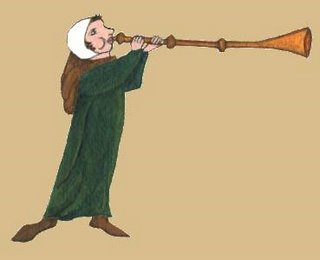A quick post to plug the Cliopatria group blog on the History News Network hosted by George Mason University, Seattle. Cardinal Wolsey has made it onto the v.long Cliopatria history blogroll (it is conveniently classified into sections), which gave a nice increase in readership just when it was getting a bit quiet - thanks folks.
23 August, 2006
22 August, 2006
Henry VIII orders licensing of "beggars, pardoners, fortune-tellers, fencers, minstrels and players", 1530

Today's event from tudor history is inspired by a recent article by Simon Davis in that well known historical journal, the London Evening Standard.
Entitled "Advice to all buskers - drop Hawaii Five-O from the repertoire", Davis gives an interesting history of the practice.
Cardinal Wolsey could not find an online version of the article to link to, so will attempt to paraphrase so as not to court trouble with the powerful interests of Associated Newspapers...
According to Davis, the word busking may derive from the Italian buscare, "to procure or gain". Alternatively in Spanish buscar means " to seek" (eg money), but it has another meaning "to wander", as in minstrels and troubadours (Latin tubare = to disturb, as is the case when a mistrel enters your tube carriage).
Davis goes further back to buskin, the knee-high boots worn by actors in Greek and Roman tragedy - he makes a slightly tenuous link to the thick-soled boots favoured by modern travelling buskers, especially those with dogs on strings leads.
The earliest mention of street performance in the West was probably in Roman legislation in AD 451, prohibiting singing of libelli famos ( satirical anti-regime songs), with death as the reasonable punishment.
Henry VIII was a little more reasonable, with only two days of whipping for unlicensed beggars, pardoners, fortune-tellers, fencers, minstrels and players.
13 August, 2006
England throws out German salesmen, 1597

This is a follow-on to the last post. It turns out that the English merchants thrown out of "Germany" (which did not actually exist at that time) were victims of ongoing power struggles between the Hanseatic League and English and Dutch trading interests. In the same year, 1597, Elizabeth I closed the Steelyard, the trading post of the League in London. The League gradually declined and was effectively defunct by the end of the 17thC.
Posted by
cardinal_wolsey
at
10:57 PM
0
comments
![]()
Labels: 16th Century History, Elizabeth I, German history, Hanseatic League, London
11 August, 2006
Germany throws out English sales people, 11th August, 1597

According to History Orb's site for today in history, and several other "this day in history" lists, English sales people were expelled from Germany on August 11th, 1597. This looked an interesting subject to write about, but I cannot find any more information on it...including the Today in German History site....(pause for short excursion into the excellent beer section of their site).
Maybe the Bad History blog carnival will be interested in this and can start a campaign for more research links to be provided from these one-liner sites.
Posted by
cardinal_wolsey
at
10:43 PM
0
comments
![]()
Labels: 16th Century History, German history, Hanseatic League
02 August, 2006
The Last Wolf in Scotland, 1743
This post was prompted by a UK newspaper article about the Wolf Conservation Trust, which led to a bit of web research on wolves in British history. The wolf has a part-mythic place in history and so the boundary between fact and fiction is slightly blurred.
By means of hunting with horses and dogs or trapping in pits, traps and cages, wolves were completely wiped out in England by the early 1500s, in Cardinal Wolsey's time. Wolves may have survived in Scotland until the mid-1700s, when deforestation finally removed their safe havens . The exact time and place date or place when the last wolf was slain is not known, but here is an [edited] account from the page on wolves in Scotland on the website of the now-defunct Glasgow Zoo:
". . One day, in the winter of 1743, in Morayshire, the ruling Laird, of MacIntosh received a message from the chief of clan Mackintosh, that a large wolf had on the preceding day killed two children, who, with their mothers, were crossing the hills from Calder.
The Laird's stalker Macqueen was consequently invited by the chief to attend a "Tainchel", or gathering in the forest of Tarnaway, in Moray, and to bring with him his dogs. A man great stature and of corresponding strength, Macquenn kept the best deer-hounds in the country
On the morning of the tryst, Mackintosh waited eagerly for Macqueen, but he only arrived at noon. As Mackintosh was about to complain of his delay, Macqueen raised his plaid, and drew from under his arm the bloody head of the aggressor. "I met the bit beastie," said Macqueen, "and this is his head...as I came through the sloch by east the hill there, I foregathered wi the beast. My long dog there turned him. I buckled wi him and kirkit him, and syne whuttled his craig, and brought awa his countenance for fear he might come alive again, for they are precarious creatures!"
Mackintosh expressed his admiration, and rewarded his vigorous kinsman with the lands of Sean-a-chan for "meat to his dogs." Macqueen of Pall-a-chrocain died in 1797"
For another link to the history of wolves in Scotland go to the Wolves and Humans site.
Also see Wolf web
Posted by
cardinal_wolsey
at
9:30 PM
0
comments
![]()
Labels: 18th Century History, Scottish history, wolves
